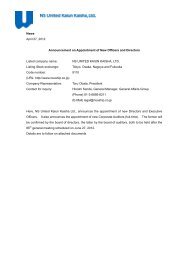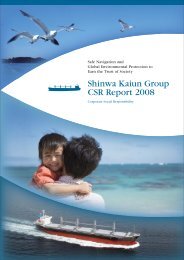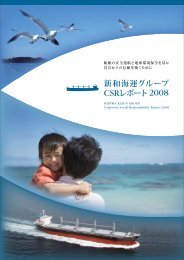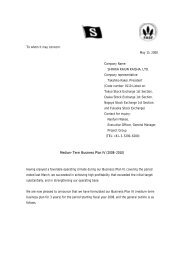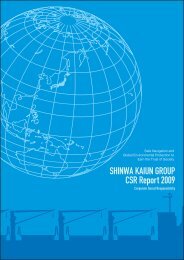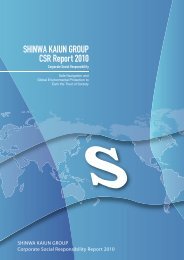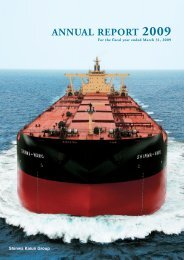Create successful ePaper yourself
Turn your PDF publications into a flip-book with our unique Google optimized e-Paper software.
Corporate Social Responsibility<br />
Prevention of Global Warming<br />
Global warming is said to be caused by greenhouse gases such as CO2. Vessels need to burn fossil fuel such as<br />
fuel oil to run, and these emit CO2-containing exhaust fumes. At present, the only effective way to reduce this<br />
CO2 gas is to reduce fuel consumption. We are taking the following measures to reduce fuel consumption:<br />
• Use of energy-saving equipment and<br />
devices.<br />
• Improving propulsion performance by<br />
hull cleaning/propeller polishing.<br />
• Speed reduction and best-route planning<br />
in accordance with changing situations.<br />
• Minimizing fuel consumption per<br />
transported unit with efficient shipping<br />
schedules and increased cargo loads.<br />
Before propeller polishing<br />
After propeller polishing<br />
Before hull cleaning<br />
After hull cleaning<br />
Installation of Lubricant (M/E Cylinder Oil) Saving Equipment<br />
The vessels owned by Shinwa Kaiun that have cross-head engines are being converted from mechanical to<br />
electronically controlled lubricators to reduce the amount of lubrication and lower cylinder oil consumption.<br />
Cross-head engines use two types of lubricant: cylinder oil in the cylinder liner and system oil in the<br />
crankcase. The system oil undergoes a circulation cycle so that it can be reused. The cylinder oil, however,<br />
cannot be reused because it is burned up inside the cylinders, and<br />
The structure of a cross-head engine this oil must be fed in constantly for the engine to continue<br />
Exhaust valve<br />
operating.<br />
Exhaust<br />
Lubrication ports There used to be mechanical lubricators attached directly to<br />
Lubricator<br />
the engine. These would feed oil at a fixed frequency (once every<br />
one or two revolutions of the engine). Now, however,<br />
Piston<br />
electronically controlled lubricators have made it possible to feed<br />
Air supply<br />
oil accurately and in a way that is appropriate to the main<br />
Piston rod engine’s current operational status. Reducing the wasteful<br />
Cross-head feeding of oil makes it possible to reduce the amount of<br />
lubrication and lower the consumption of cylinder oil. Shinwa<br />
Crankshaft Kaiun is actively engaged in fitting electronically controlled<br />
lubricators.<br />
Shinwa Kaiun Group <strong>Annual</strong> <strong>Report</strong> <strong>2010</strong> 10



![[Consolidated] Balance Sheet (B/S)(PDF/35KB)](https://img.yumpu.com/49745625/1/184x260/consolidated-balance-sheet-b-spdf-35kb.jpg?quality=85)
